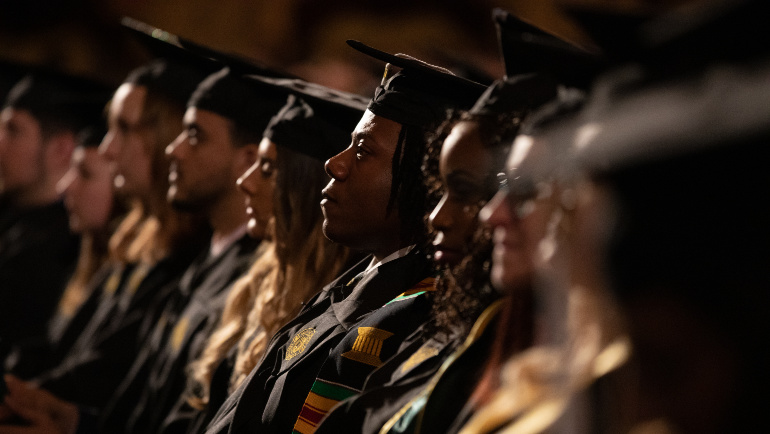
Wayne State University’s rise as a national model for student success hit a new milestone in May, as its six-year graduation rate surpassed its goal of 50% more than a year prior to completion of its “Distinctively Wayne State” strategic plan. The current six-year graduation rate is 50.5%. Data indicates that it will improve to between 51% and 52% following the completion of spring and summer courses.
This builds upon nearly a decade of student success accomplishments, innovations and recognition, including receipt of the 2018 Association of Public and Land-grant Universities (APLU) Project Degree Completion Award for being the most rapidly improving university in the nation.
“It is unheard of for a university to achieve record-setting improvement of this magnitude this rapidly,” said Wayne State President M. Roy Wilson. “I am grateful for the commitment of our faculty, the passion of our student success team, and the efforts of our students and the entire campus. I know I speak for them when I say we are still not satisfied. This improvement fuels the fire for greater advances.”
In 2011, when the university launched its Student Success Initiative, its six-year graduation rate was 26%. Since then, Wayne State has provided more than 275,000 one-on-one advising appointments, which have contributed to students successfully earning more credits and better grades.
Because of the students’ accelerated progress, on average they are graduating a semester and a half earlier. This has resulted in Wayne State graduating about 900 additional students each year.
Graduation rate gains also continue to be made among first-generation and low-income students, as well as students of color. The African American four-and five-year graduation rates continue to rise, and the six-year graduation rate is projected to improve to 25% in September, an improvement of 18 percentage points, or more than triple, since 2011. With additional large increases projected for the four- and five-year graduation rates, this trend is expected to continue not only for black students, but also for Latinx, first-generation and low-income students.
“Our students are learning, growing and transforming themselves,” said Monica Brockmeyer, senior associate provost for student success. “I like to think of us as an institution that is doing the same. We took a hard look at ourselves years ago, abandoned preconceived notions, and found new and better ways to do things, and that’s exactly what we want our students to do when they come to college.”
The Student Success Initiative started with a multimillion-dollar investment in additional support programs for students, the centerpiece of which was the hiring of more than 45 academic advisors and other academic support staff. In total, more than 150 projects and initiatives have contributed to the increased success of students over the last decade. This includes expansion of the Office for Teaching and Learning, the hiring of Wayne State’s first chief diversity officer, an overhaul of the general education program and innovative financial aid programs.
One overarching and successful initiative, dubbed the Warrior Vision and Impact Program (Warrior VIP), offers students coordinated care and a suite of services designed to help navigate the academic, social and financial challenges of college. The program ensures students have access to career services, financial literacy, study skills and tutoring, and that they are establishing goals and building relationships with faculty, staff and peers to ensure that they accomplish those goals.
Second-year Warrior VIP student William Voker says the university’s support has been critical to his success and positive experience.
“When I started my first semester, I was so worried about how I was going to pay for school and how I was going to adjust to the new environment,” said Voker. “Through my learning community, I have many people around me who want me to succeed and who provide academic, mental and emotional support. My scholarship allowed me to focus on my academic performance instead of on other distracting factors. I have been able to experience moments of decision-making that have made me more confident in myself and my abilities, and I truly am grateful to be a WSU student.”
The focus on student achievement and belonging has spawned learning communities such as RISE, devoted to female students, and The Network, focused on male students. It has also resulted in staff-led student support groups devoted to a more personalized, intimate approach to advising and mentoring students of color.
Provost and Senior Vice President for Academic Success Keith Whitfield says it all adds up to a culture change at Wayne State.
“As an African American man who almost dropped out of college to become a truck driver, I understand how many things have to go right for many of our students to not only get to college, but to persist and thrive,” said Whitfield. “We have made a conscious shift to viewing students holistically as human beings, each having great things to offer the world. This work is deeply personal for our campus, and I am incredibly proud of our accomplishments so far. But make no mistake, this is not the end of the improvement in graduation rates, and we will be reducing racial disparities in achievement. Helping students improve their lives and the lives of their families through education is not just a job — this is our passion.”
